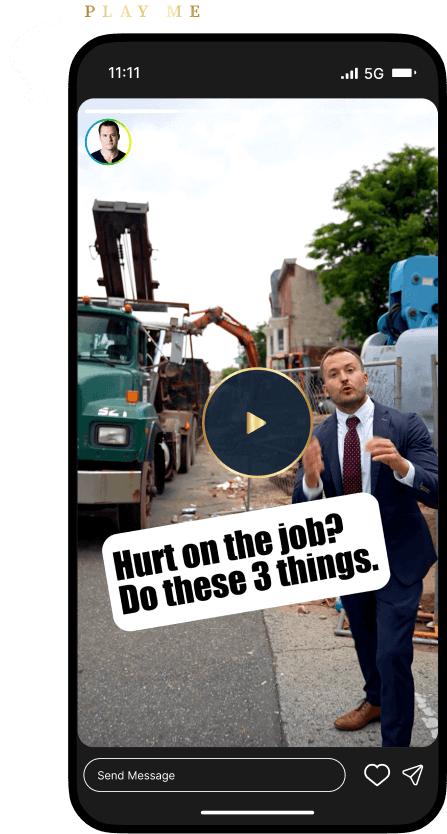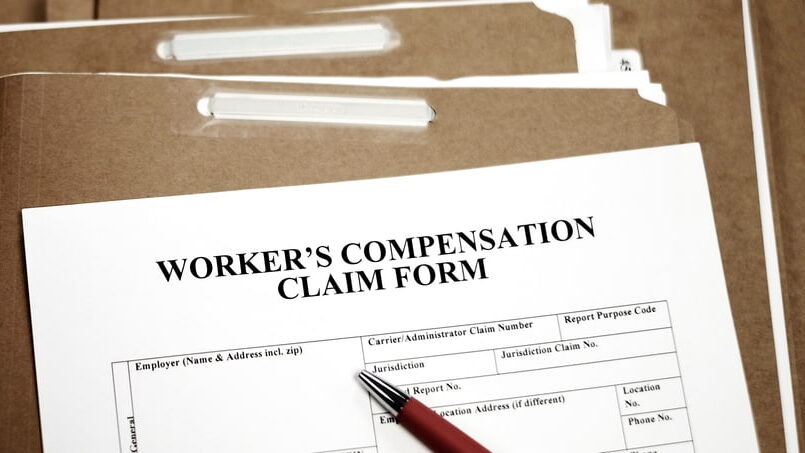Home » Workers’ Compensation » Missouri Workers’ Compensation Lawyer
A workplace injury can lead to overwhelming medical expenses, lost wages, and uncertainty about your ability to return to work.
Missouri’s workers’ compensation system is designed to help injured employees recover financially, but the claims process can be complex. Many workers experience delays, denials, or reduced benefits, making it difficult to focus on their recovery.
If you have been injured on the job, you may be entitled to workers’ compensation benefits. Seeking legal guidance can help ensure that your claim is handled correctly and that you receive the financial support you need. Call TopDog Law Personal Injury Lawyers at (314) 789-1888 today for your free case evaluation.

It costs absolutely nothing to see if you have a case



Workplace injuries can leave employees struggling with medical bills, lost wages, and uncertainty about their future. Missouri workers who are hurt on the job have the right to seek benefits through the state’s workers’ compensation system. However, filing a claim is not always straightforward, and employers or insurance companies may try to minimize payouts or deny claims altogether.
TopDog Law connects injured workers with Missouri workers’ compensation lawyers who understand how to navigate these challenges. A lawyer from TopDog Law’s network can help injured employees file their claims correctly, challenge unfair denials, and pursue full benefits under Missouri law. Workers do not have to handle these claims alone—having legal support can make all the difference.
Many injured workers assume that filing a workers’ compensation claim is simple, but in reality, employers and insurance companies may dispute claims to avoid large payouts. Workers may face claim denials, delayed payments, or pressure to return to work before they are fully recovered. Others may not even be aware of the full benefits they are entitled to receive.
A Missouri workers’ compensation lawyer from TopDog Law’s network can ensure that injured employees receive the medical treatment and wage replacement benefits they deserve. They can also assist with appealing a denied claim, negotiating a fair settlement, or pursuing additional compensation if a third party was responsible for the injury.
Having the right legal help ensures that employers and insurance companies do not take advantage of injured workers.

Missouri law provides a range of benefits for employees who are injured while performing job-related duties. These benefits can help cover medical expenses and lost wages while the worker recovers.
Workers’ compensation benefits may include:
Not all injured workers receive the full benefits they are entitled to, and some claims are denied without valid reasons. TopDog Law connects injured employees with Missouri workers’ compensation lawyers who can ensure they receive the maximum benefits allowed under the law.
Workers’ compensation claims can be denied for a variety of reasons, even when the injury is clearly job-related. Common reasons for denial include:
When a claim is denied, employees have the right to appeal the decision through the Missouri Division of Workers’ Compensation. The appeals process involves gathering medical records, witness statements, and expert opinions to support the claim.
A Missouri workers’ compensation lawyer can assist in filing an appeal, negotiating with the insurance company, and representing the worker in hearings if necessary.
Workers in Missouri must notify their employer of a work-related injury within thirty days of the accident or discovery of the condition. Failure to report an injury within this time frame can jeopardize the ability to receive benefits.
The official deadline for filing a workers’ compensation claim is two years from the date of injury or the last date of benefits received. In some cases, the deadline may be extended to three years if the employer failed to report the injury to the Division of Workers’ Compensation. Acting quickly ensures that medical evidence is preserved and that there is ample time to navigate the claims process.


Workers’ compensation generally prevents employees from suing their employer for workplace injuries, but there are exceptions. A worker may have grounds for a lawsuit in cases involving:
If a third party played a role in causing the injury, an employee may be able to pursue a personal injury claim in addition to seeking workers’ compensation benefits. This can result in additional compensation beyond what is available through a standard claim.
Medical records play a critical role in proving the extent of a workplace injury and the need for benefits. Insurance companies frequently challenge claims by arguing that injuries are not severe or that pre-existing conditions contributed to the worker’s condition. Comprehensive medical documentation helps prevent these disputes.
Medical evidence that supports a workers’ compensation claim includes:
If an employer’s insurance provider attempts to minimize the severity of an injury, workers have the right to seek a second opinion from an independent medical professional.


Many injured employees assume that filing a workers’ compensation claim is a simple process, only to face challenges such as delayed payments, denied claims, or reduced benefits. A Missouri worker’s compensation lawyer can help navigate the process and advocate for the injured worker’s rights. Legal assistance can be beneficial in several ways, including:
Employers and their insurance companies have legal teams working to limit claims. Injured workers can benefit from having legal representation to ensure they receive the compensation they are entitled to.
In some cases, an injured worker may be able to return to work in a limited capacity before making a full recovery. Missouri’s workers’ compensation system allows employers to offer modified work or light-duty assignments as an alternative to keeping an employee off the job completely.
A light-duty assignment typically involves fewer physical demands than the employee’s original job, modified work hours or shortened shifts, temporary placement in a different department until full recovery, or restrictions on lifting, standing, or repetitive motion tasks.
If an employer offers a light-duty position that aligns with the worker’s medical restrictions, the employee may be required to accept the job or risk losing certain benefits. However, if the new position is outside the doctor’s recommendations, the worker has the right to challenge the assignment.
Speaking with a Missouri worker’s compensation lawyer can help determine whether an employer’s light-duty offer is appropriate.
Insurance companies frequently deny or reduce workers’ compensation claims by citing pre-existing conditions. While Missouri law does not allow insurers to reject claims outright because of prior injuries, they may argue that the new injury is simply an aggravation of an old one and therefore not covered.
Workers may still qualify for benefits if the workplace accident made a pre-existing condition worse, a work-related injury occurred independently of prior medical issues, or a repetitive strain injury developed over time due to job duties.
If an insurance provider attempts to use a pre-existing condition as a reason to deny benefits, medical documentation and expert testimony can help demonstrate that the injury is work-related and should be covered.


Most Missouri employers are legally required to carry workers’ compensation insurance. However, some businesses fail to meet this obligation. If an employer does not have coverage, injured employees still have legal options to seek compensation.
Workers may be able to file a claim with the Missouri Second Injury Fund, which helps injured employees when an employer does not provide required insurance. They may also have the option to file a personal injury lawsuit against the employer for failing to carry proper coverage or explore third-party liability claims if another company or individual contributed to the injury.
Employers who do not carry workers’ compensation insurance may face penalties, including fines and criminal charges. Employees in this situation may need legal assistance to ensure they receive the compensation they need for medical expenses and lost wages.
Workers’ compensation is often the primary way for employees to receive benefits after a workplace injury, but there are situations where an injured worker may also be eligible to file a personal injury lawsuit.
Workers’ compensation does not require proof of employer negligence, but it limits the amount of compensation available. Personal injury lawsuits allow injured employees to seek full damages, including pain and suffering, but require proof that someone else was negligent. Third-party lawsuits may be an option if a contractor, equipment manufacturer, or another party was responsible for the injury.
For example, if a worker was injured due to defective machinery or a reckless driver while on the job, they may have grounds for a personal injury claim in addition to a workers’ compensation claim.


Insurance companies often use surveillance tactics to monitor injured workers and look for reasons to deny or reduce benefits. Some common methods include video surveillance near the worker’s home or public places, social media monitoring to find posts or activities that contradict injury claims, and private investigators tracking the worker’s movements and behaviors.
If an insurance company claims that a worker’s daily activities contradict their reported injury, benefits may be reduced or denied. Injured workers should be cautious about what they post online and should follow all medical restrictions carefully to avoid disputes in their case.
A functional capacity evaluation is a test used to assess a worker’s physical abilities and determine whether they can return to their job. Employers and insurance companies often request these evaluations when there is a dispute about work restrictions or whether the worker can perform certain tasks.
A functional capacity evaluation typically involves strength and endurance testing, lifting and mobility assessments, simulated work tasks, and evaluations by a licensed physical therapist or medical professional.
If the results of an evaluation are disputed, an injured worker may need additional medical opinions or legal assistance to challenge the findings.

While some workers’ compensation claims are processed without issue, many injured employees encounter challenges such as delayed payments, denied claims, or reduced benefits. Insurance companies often look for ways to minimize payouts, and without legal assistance, injured employees may receive far less than they need for recovery.
A Missouri worker’s compensation lawyer can help ensure all paperwork is filed correctly to prevent delays, gather medical records and expert testimony to support the claim, challenge unfair denials or benefit reductions, negotiate with the insurance company for a fair settlement, and represent the worker at hearings if an appeal is necessary.
Many workers who attempt to handle their claim alone receive lower benefits or face unnecessary obstacles. Having legal representation can help protect an injured employee’s financial future.
Navigating the workers’ compensation system can be difficult, especially when dealing with an employer or insurance company that is reluctant to pay full benefits. Having legal representation can help injured workers secure the financial support they need to recover.
TopDog Law connects injured Missouri workers with attorneys who understand the state’s workers’ compensation laws and know how to fight for fair treatment. A legal case review can determine the best course of action, whether that means filing an initial claim, appealing a denial, or negotiating a fair settlement.
Call (314) 789-1888 to begin a case review today. Workers should not have to fight for benefits alone. Having the right Missouri worker’s compensation lawyer can make all the difference in securing financial stability after a workplace injury.

TopDog Law is known for its relentless pursuit of justice. Our experienced team fights tirelessly to secure maximum compensation for our clients, ensuring every case is handled with dedication and determination.
We understand the emotional and financial toll that personal injuries can take. That’s why we prioritize open, compassionate communication and provide tailored support throughout the legal process. With free consultations and a contingency fee model, you won’t pay a dime unless we win your case.
With TopDog Law on your side, you can rest assured that you have a tenacious, experienced team fighting to get you the compensation you deserve, no matter where you’re located.

TopDog Law is a national marketing network for law firms, including Helm Law Group, LLC, which license the TopDog Law name and separately operate in states where they are each licensed. James Helm is licensed to practice in Arizona and Pennsylvania. Helm Law Group, LLC operates in Arizona.
3225 Cumberland Blvd, Ste 100
Atlanta, GA 30339
111 Presidential Blvd., Suite 251
Bala Cynwyd, PA 19004
1 South St, Suite 2125A
Baltimore, MD 21202
950 22nd Street N. Suite 600
Birmingham, AL 35203
361 Newbury Street, 3rd Floor
Suite 310
Boston, MA 02115
305 E 204th St.
Bronx, NY 10467
215 E 5th St, Unit 1 Suite 400-3
Brooklyn, NY 11218
1207 Delaware Ave, Suite 012
Buffalo, NY 14209
101 N Tryon St. Suite C
Charlotte, NC 28246
6343 S Western Ave.
Chicago, IL 60636
2217 E 9th St, Suite A
Cleveland, OH 44115
66 S Logan St Suite B
Denver, CO 80209
645 Griswold Street, Suite 1309
Detroit, MI 48226
863 Massachusetts Ave 2nd floor Suite B
Indianapolis, IN 46204
317 E Capitol St suite 200C
Jackson, MS 39201
1701 Troost Ave suite 202b
Kansas City, MO 64108
#8 Shackleford Plaza, Suite 304
Little Rock, AR 72211
8124 W 3rd St, Suite 201
Los Angeles, CA 90048
3385 Airways Blvd Unit 301F
Memphis, TN 38116
1433 N Water St Suite 400D
Milwaukee, WI 53202
600 Mount Prospect Avenue, Suite A
Newark, NJ 17104
66 Franklin St, Suite 300C
Oakland, CA 94607
5627 Germantown Ave Suite 420
Philadelphia, PA 19144
2700 N Central Ave Suite 320B
Phoenix, AZ 85004
6425 Living Place, Suite 200
Pttsburgh, PA 15206
920 West Sproul Road, Suite 201
Springfield, PA 19064
4625 Lindell Blvd Suite 200 & 300C
St. Louis, MO 63108
1150 Connecticut Ave NW, Suite 802B
Washington, DC 20036
6832 W North Ave Suite 2A
Chicago, IL 60707
3509 Haverford Ave, Suite 102
Philadelphia, PA 19104
Copyright 2025 All Rights Reserved © TopDog Technologies, Inc. and Helm Law Group, LLC
403 Olde House Lane Media, PA 19063
